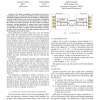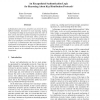17 search results - page 3 / 4 » A simple proof of the unconditional security of quantum key ... |
CRYPTO
2004
Springer
13 years 10 months ago
2004
Springer
Unconditionally secure multi-party computations in general, and broadcast in particular, are impossible if any third of the players can be actively corrupted and if no additional i...
ATAL
2005
Springer
13 years 10 months ago
2005
Springer
The aggregation of conflicting preferences is a key issue in multiagent systems. Due to its universality, voting has a central role among preference aggregation mechanisms. Votin...
RIVF
2007
13 years 6 months ago
2007
— This paper investigates the problem of secret key transmissions for an arbitrary Alice-Bob pair in Quantum Key Distribution (QKD)-based networks. We develop a realistic QKDbase...
CSFW
2005
IEEE
13 years 11 months ago
2005
IEEE
Authentication and secrecy properties are proved by very different methods: the former by local reasoning, leading to matching knowledge of all principals about the order of their...
CRYPTO
2011
Springer
12 years 5 months ago
2011
Springer
We present a somewhat homomorphic encryption scheme that is both very simple to describe and analyze, and whose security (quantumly) reduces to the worst-case hardness of problems ...


